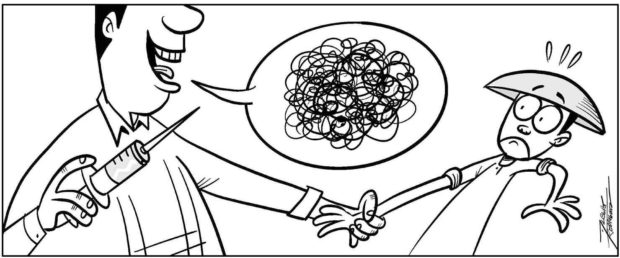Tell it like it is

With the World Health Organization’s confirmation of the Delta variant becoming the dominant variant of COVID-19 worldwide, the report on more than 350 physicians and medical workers in Indonesia catching the coronavirus despite the benefit of vaccination becomes doubly worrisome.
Apart from appearing to back the hardline position of those opposed to vaccination, the report boosts the idea that Sinovac, the China-made vaccine administered to much of Indonesia’s population—with its 51-percent efficacy rate only just making the WHO benchmark — is no match to the highly transmissible Delta variant first identified in India.
Filipinos jabbed with Sinovac — the majority among those inoculated — are anxiously looking to the Department of Health to explain the Indonesian outbreak and its possible impact on their own experience. Most of the infected Indonesians were said to be without symptoms and in isolation at home, but dozens were “in hospital with high fevers and declining oxygen saturation levels.”
The report was dated June 17. Within the next two days, Health Undersecretary Maria Rosario Vergeire said that there was no cause for alarm, that the DOH could not complete its analysis of the case without all the facts, and that experts still had questions about the report.
The follow-up response came last Monday, with not much said about the Indonesian experience. We wonder why. The report was not by some hack inventing details on, say, Julian Felipe Reef, but by Reuters, the world’s largest multimedia news provider.
This dearth of clear explanation from the DOH spokesperson and the experts she often cites does nothing to boost public confidence and belief in the current motto that “the best vaccine is the one that’s available” or — as in a fait accompli — “in your arm.”
Filipinos generally want to believe in the wisdom of vaccination for all, that no one is safe until everyone is safe, but it behooves their leaders or those who speak for them to respond quickly and effectively to urgent questions and not hedge on details.
Vergeire was earlier quoted as saying that the total number of health care workers in Indonesia was not mentioned in the report, and therefore no perspective could be gleaned on the number of those infected. But the report specified the district Kudus in central Java, which has some 5,000 health care workers; no one was asking for perspective vis-à-vis the entire great nation of Indonesia.
Still Vergeire was quoted as saying that with the figures presented, 2-3 percent were infected and 97 percent were protected, and most were asymptomatic.
“We see that the vaccine is working. There are a few breakthrough infections, and these are being studied,” she said.
Yet here’s what Dicky Budiman, an epidemiologist at Australia’s Griffith University, told Reuters: “The data shows they have the Delta variant (in Kudus) so it is no surprise that the breakthrough infection is higher than before, because as we know, the majority of health care workers in Indonesia got Sinovac, and we still don’t know yet how effective it is in the real world against the Delta variant.”
In fact vaccine hesitancy seems no longer a problem in this country, and there is no need for President Duterte to gruffly threaten the arrest of or, earlier, invoke death and damnation on the “ayaw magpabakuna.” Mindful of procedure, many have properly registered and waited impatiently to be summoned for vaccination—often only to learn that walk-in jabs can be had easily.
In fact local government units outside NCR Plus 8 are pleading for vaccine allocations. Yet the weary observer feeling pressure to get a jab now, and remembering the thousands-strong horde that converged for a tiny number of Pfizer doses, has reason to be conflicted over Sinovac. Says Vergeire: “We see that the vaccine is working.” But says epidemiologist Budiman: “We still don’t know yet how effective it is in the real world…”
Reuters also reported that Costa Rica, which is gripped by a severe COVID-19 outbreak, rejected a Sinovac delivery after health officials examined clinical data and decided that it was not sufficiently effective. The makers of the vaccine, after all, had never seen fit to release the results of its clinical trials.
The DOH, in speaking for the pandemic response team, should constantly explain to Filipinos what is going on beyond a daily listing of infections, recoveries and deaths. It should tell it like it is, use clear language, and not be afraid of, for example, calling the First Daughter’s turf, one among areas in the throes of an outbreak, an epicenter of the contagion.




















